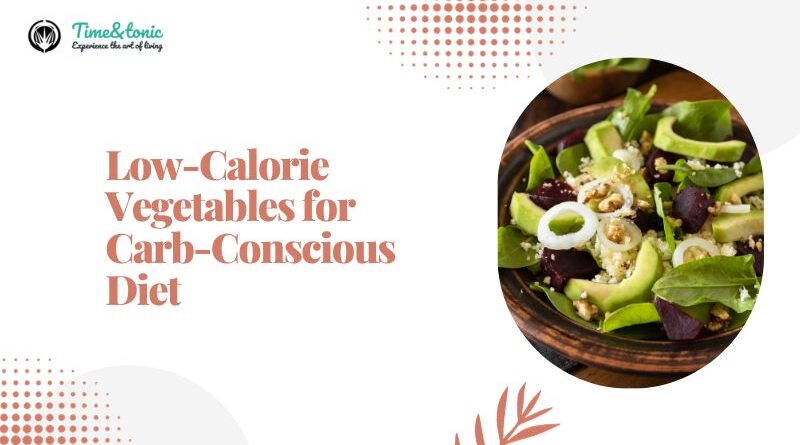Low-Calorie Vegetables for Carb-Conscious Diet
Low-Calorie Vegetables for Carb-Conscious Diet – Are you on a mission to shed those extra pounds while keeping a close watch on your carb intake? If so, you’re not alone. Many individuals today are embracing carb-conscious diets to support their weight management goals and overall health. One of the key pillars of such a dietary approach is the incorporation of low-calorie vegetables.
Low-calorie vegetables are a godsend for anyone looking to cut calories without sacrificing flavor or nutritional value. In this comprehensive guide, we’ll delve deep into the world of low-calorie vegetables and their significance in a carb-conscious diet. From leafy greens to crisp cucumbers and cruciferous delights, we’ll explore the top choices that can transform your meals while helping you stay on track with your carb goals.
But it’s not just about listing vegetables – we’ll dive into their nutritional profiles, sharing tips on how to include them creatively in your meals, and even provide mouthwatering recipes that will make your taste buds dance. Whether you’re a seasoned carb-conscious eater or just starting your journey, this guide is your ticket to a flavorful, satisfying, and health-conscious way of eating. Let’s embark on this exciting vegetable-filled adventure together!
What Is a Carb-Conscious Diet?
A carb-conscious diet, also known as a low-carb diet, is a dietary approach focused on reducing the intake of carbohydrates, particularly refined and starchy carbs. The primary goal is to manage blood sugar levels, promote weight loss or maintenance, and improve overall health. In a carb-conscious diet, emphasis is placed on consuming foods rich in protein, healthy fats, and non-starchy vegetables while limiting or avoiding high-carb items like bread, pasta, and sugary snacks. This dietary strategy can be effective for weight management and may also benefit individuals with conditions like diabetes and metabolic syndrome.
Also, Read – Low Carb Midnight Snacks
Benefits of a Carb-Conscious Diet
- Weight Management: Carb-conscious diets are often associated with effective weight loss and maintenance. By reducing carbohydrate intake, the body relies on stored fat for energy, promoting gradual and sustainable weight loss.
- Blood Sugar Control: Carb-conscious diets can help stabilize blood sugar levels, making them particularly beneficial for individuals with diabetes or those at risk of developing the condition. Lower carb intake leads to less significant blood sugar spikes and crashes.
- Improved Heart Health: Reducing carbohydrate intake, especially refined carbs, can lead to lower levels of triglycerides and an increase in “good” HDL cholesterol. This can reduce the risk of heart disease.
- Appetite Control: Protein and fiber-rich foods, often emphasized in carb-conscious diets, help control hunger and increase feelings of fullness. This can lead to reduced calorie intake and easier portion control.
- Better Insulin Sensitivity: Lower carb consumption can enhance insulin sensitivity, allowing cells to use blood sugar more effectively. This can be beneficial for individuals with insulin resistance or metabolic syndrome.
- Enhanced Mental Clarity: Some people on carb-conscious diets report improved mental clarity and reduced brain fog. Stable blood sugar levels may contribute to better cognitive function.
- Increased Energy Levels: While the initial adjustment period may lead to fatigue, many individuals report increased energy levels once their bodies adapt to burning fat for fuel.
- Reduced Risk of Type 2 Diabetes: A carb-conscious diet can reduce the risk of developing type 2 diabetes, especially in individuals with prediabetes or a family history of the disease.
Low-Calorie Vegetables for Carb-Conscious Diet

Leafy Greens
Leafy greens like spinach, kale, Swiss chard, arugula, and Romaine lettuce are exceptional choices for a low-calorie, carb-conscious diet. These nutrient-dense vegetables offer minimal carbohydrates and calories. They’re rich in vitamins, such as A, C, and K, and provide essential minerals like iron and calcium.
Moreover, their high fiber content aids in digestion and promotes a feeling of fullness. Incorporating these greens into salads, smoothies, or as a side to your meals can enhance both flavor and nutrition in your diet, supporting your health and weight management goals.
Cruciferous Vegetables
Cruciferous vegetables, including broccoli, cauliflower, Brussels sprouts, and cabbage, are excellent choices for a low-calorie, carb-conscious diet. These veggies are not only low in carbohydrates and calories but also packed with essential nutrients. They’re rich in vitamins C, K, and folate, as well as minerals like potassium.
Additionally, cruciferous vegetables contain unique compounds that have been linked to various health benefits, including potential cancer-fighting properties. Incorporate them into your meals by roasting, steaming, or sautéing for a delicious and nutritious addition to your diet. Their fiber content also aids in satiety, making them a valuable component of a carb-conscious eating plan while providing a range of health benefits.
Zucchini and Other Summer Squash
Zucchini and other summer squash varieties like yellow squash are fantastic choices for a low-calorie, carb-conscious diet. These vegetables are incredibly low in carbohydrates and calories, making them perfect for those watching their carb intake. Zucchini and summer squash are also high in water content, which helps keep you hydrated and satisfied. They provide essential nutrients like vitamins C and B6, as well as minerals such as potassium and manganese.
You can enjoy them in various ways, including grilling, sautéing, or spiralizing them into low-carb noodle alternatives. These versatile vegetables can add flavor, texture, and nutrition to your meals without significantly impacting your carb count.
These versatile veggies can be enjoyed raw in salads, sliced as crunchy snacks, or cooked into various dishes like stir-fries and stuffed peppers. Their vibrant colors not only make your meals visually appealing but also add a nutritious punch to your diet without compromising your carb-conscious goals.
Also, Read – Midday Low Carbs Lunch Ideas

Cucumber
Cucumbers are a refreshing and hydrating addition to a low-calorie, carb-conscious diet. These crisp vegetables are incredibly low in carbohydrates and calories, making them an ideal choice for those focused on managing carb intake. Cucumbers are mostly composed of water, which helps keep you hydrated while contributing to a feeling of fullness. They are also a good source of vitamins and minerals, particularly vitamin K and potassium.
Cucumbers are versatile and can be sliced into salads, used as crunchy dippers with dips like hummus, or incorporated into refreshing cold soups. Their mild flavor and high water content make them a guilt-free and hydrating option for staying on track with your carb-conscious eating plan.
Asparagus
Asparagus is a nutritious and low-calorie vegetable that fits perfectly into a carb-conscious diet. With minimal carbohydrates and calories, it’s an excellent choice for those watching their carb intake. Asparagus is rich in vitamins and minerals, particularly vitamin K, vitamin C, and folate. It also provides dietary fiber, which supports digestive health and helps maintain a feeling of fullness. Additionally, asparagus contains antioxidants that contribute to overall well-being.
Preparation options for asparagus are versatile – you can roast, grill, steam, or sauté it to bring out its delicious flavor and tender texture. Adding asparagus to your meals not only enhances taste but also contributes valuable nutrients to your diet while keeping your carb consumption in check.
Mushrooms
Mushrooms are a fantastic addition to a low-calorie, carb-conscious diet. These fungi are extremely low in carbohydrates and calories, making them a smart choice for those managing carb intake. They offer a unique savory flavor and a meaty texture, making them a great option for adding depth to various dishes without adding excess calories or carbs.
Mushrooms are also a source of important nutrients, such as B-vitamins, selenium, and antioxidants, which support overall health. They can be used in a variety of ways, from sautéing and grilling to stuffing and using as a meat substitute in recipes. Including mushrooms in your diet not only enhances flavor but also provides nutritional value while helping you maintain a carb-conscious approach to eating.

Green Beans
Green beans are a nutritious and low-calorie vegetable suitable for a carb-conscious diet. These crisp, slender pods are relatively low in carbohydrates and calories, making them an excellent choice for those monitoring their carb intake. Green beans are a rich source of essential vitamins and minerals, particularly vitamin C, vitamin K, and folate. They also include dietary fiber, which helps with satiety and digestive health.
Green beans are incredibly versatile in the kitchen. You can steam, sauté, roast, or even stir-fry them to create delicious side dishes or incorporate them into salads and casseroles. Their mild, slightly sweet flavor complements a wide range of flavors, making them a valuable addition to your diet while keeping your carb consumption in check.
Spaghetti Squash
Spaghetti squash is a fantastic low-calorie, carb-conscious alternative to traditional pasta. With only a fraction of the carbohydrates and calories found in wheat-based noodles, it’s a popular choice for those watching their carb intake. When cooked, the flesh of spaghetti squash naturally forms noodle-like strands, providing a satisfying texture.
Spaghetti squash is a source of vitamins and minerals, including vitamin C, vitamin B6, and manganese. It’s also rich in dietary fiber, aiding in digestion and promoting a feeling of fullness.
To prepare spaghetti squash, you can roast or microwave it, then use a fork to scrape out the spaghetti-like strands. These can be served with your favorite pasta sauces, pesto, or as a base for various creative dishes. It’s a flavorful, low-carb option that allows you to enjoy the taste and texture of pasta while aligning with your carb-conscious dietary goals.
Onions
Onions are a flavorful addition to many dishes, but they should be used in moderation if you’re following a low-carb or carb-conscious diet. Onions do contain carbohydrates, primarily in the form of natural sugars and dietary fiber. However, their carb content is relatively low compared to many other vegetables.
While onions have a slightly higher carb content than some other low-carb veggies, they offer a unique flavor and aroma that can enhance the taste of your meals. They also provide essential nutrients like vitamin C, vitamin B6, and antioxidants, contributing to your overall well-being.
When incorporating onions into your carb-conscious diet, consider using them sparingly as a flavor enhancer in salads, stir-fries, or as a base for soups and sauces. By practicing portion control, you can enjoy their taste without significantly affecting your carb intake.
Peas
Peas, while nutritious, have a somewhat higher carbohydrate content compared to many other non-starchy vegetables, so they should be consumed in moderation on a low-carb or carb-conscious diet. They offer dietary fiber, vitamins (like vitamin C and vitamin K), and essential minerals (such as iron and manganese). However, they also contain natural sugars and starches, which contribute to their carbohydrate count.
A half-cup serving of cooked peas contains approximately 9-10 grams of carbohydrates. If you’re closely monitoring your carb intake, it’s essential to be mindful of portion sizes when enjoying peas. You can use them sparingly as a side dish or add them to recipes to provide flavor and nutritional value without significantly increasing your carb intake. While not as low in carbs as some other vegetables, peas can still be part of a balanced, carb-conscious diet when consumed in moderation.
Conclusion
A carb-conscious diet isn’t just a fleeting trend; it’s a lifestyle choice with a host of benefits. By embracing a diet that’s lower in carbs and rich in nutrient-packed vegetables, you can take control of your weight, blood sugar, and overall health. The advantages, from weight management to enhanced heart health and increased energy, are compelling reasons to explore this dietary approach. Remember, the journey to better health and well-being begins with mindful choices, and a carb-conscious diet, supported by the power of low-calorie vegetables, can be your path to a healthier, happier you. So, why wait? Start reaping the rewards today!
FAQs
A carb-conscious diet, also known as a low-carb diet, is an eating plan that focuses on reducing the intake of carbohydrates, particularly refined and starchy carbs, in order to manage weight and improve overall health.
No, not all carbohydrates are bad. Carbohydrates are an essential macronutrient, and the type and quality of carbs matter. Whole grains, fruits, and vegetables are sources of healthy carbohydrates, while refined sugars and white bread are examples of less healthy options.
Benefits include weight management, improved blood sugar control, better heart health, appetite control, enhanced insulin sensitivity, increased energy levels, and a reduced risk of type 2 diabetes.




